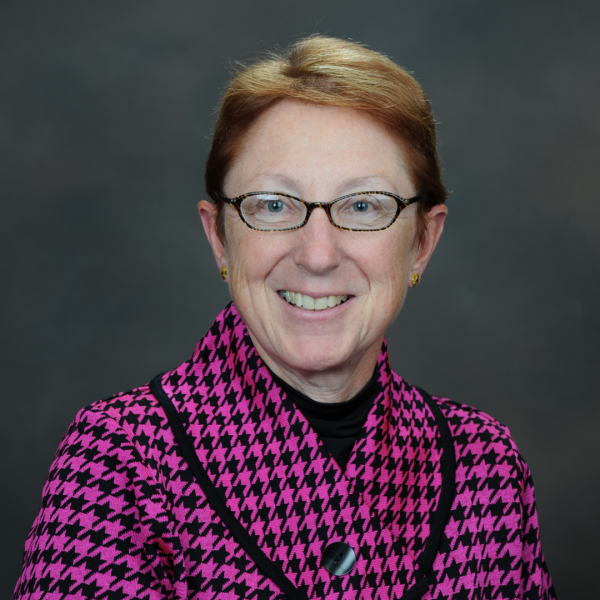Making Important Strides at the Intersection of Anesthesiology and Pharmacy

By: Markie Heideman, Content Marketing Manager
If you ask Deb Wagner, PharmD, to describe a typical day in her role as a Clinical Pharmacist at Michigan Medicine, she probably can’t give you a straight answer. She wears many hats splitting her time between Pharmacy Services, Children and Women’s Administration and the Department of Anesthesiology while also helping shape future pharmacy leaders as a Clinical Professor in the College of Pharmacy and a Clinical Professor of Anesthesiology in the U-M Medical School.
A Pharmacist’s Role in Anesthesiology
A pharmacy specialist in anesthesiology, Dr. Wagner focuses her time on ensuring quality assurance for patients in the operating room.
“I manage clinical pathways for medications within the Department of Anesthesiology and Operating Room Pharmacy,” Wagner explained. “These pathways are essentially a map that outlines the sequence of treatments or medications a provider should prescribe a patient based on their condition or based on the type of care they are receiving.”
Because anesthesiologists are experts in dosing and drug interactions, much of Dr. Wagner’s role as a pharmacist in this space revolves around patient safety and working with government agencies to ensure the medication being used is still the best course of action for patients at Michigan Medicine.
“Right now, I’m working with Harvard on an analysis of national patient safety goals for anesthesia and medication safety in the operating room. Many of those goals are medication-related in terms of labeling, drawing up sterile products for administration, and packaging.”
Additionally, much of Dr. Wagner’s research focuses on anesthesiology and ways to improve patient care in that space. A recent study published by Wagner and her co-authors looked into sugammadex, a medication used to reverse neuromuscular blockade (or, essentially, wake the muscles up) induced by the medications rocuronium and vecuronium that are used in general anesthesia.
The study fractioned the sugammadex into smaller doses to help reduce waste and reduce costs for patients. An analysis of dosing practices from 2019 to 2023 showed that it did just that – reduced waste. It also found that there was a higher likelihood of underdosing a patient. The study concluded that although this practice could enable increased access to sugammadex and other costly medications, it may introduce unintended consequences.
She is also directly involved in issues related to pain management options for patients and works closely with the Acute Pain Service that reports to the Department of Anesthesiology as well
When Dr. Wagner isn’t staying busy with patient care and research, she is using her expertise to impact the community.
Making an Impact Across Communities
Dr. Wagner’s work extends far beyond the walls of the College of Pharmacy and Michigan Medicine. Passionate about making a change in healthcare, she sits on a number of boards including the EMS Trauma and Quality Assurance Committee for the state, Michigan Hospital Association Pediatric Safe Table, and the Medical Control Board for EMS services of Washtenaw and Livingston County as well as Western Wayne County– just to name a few.
One involvement Dr. Wagner is most proud of is serving in the group responsible for maintaining the MI-TESA Medical Unit, a 100-bed portable medical surge hospital that can be set up in cases of disaster anywhere in the state.
“It’s state-of-the-art and I have been working on the pharmacy piece of this unit for years,” Wagner explained. “It’s extremely rewarding to know that I am making an impact on the community by using my individual expertise to help people facing extreme hardships.”
Within Michigan Medicine, Dr. Wagner lends her expertise to multiple executive leadership committees including Cardiopulmonary Resuscitation, Pharmacy and Therapeutics, Pain, Sedation, VTE, CPR to disaster preparedness. She is also the administrative lead over the Pediatric Medication Safety Committee that reviews medication issues related to the pediatric population.
“I have a lot of high-level exposure to a number of things in my role at the hospital so I am able to be a sounding board and problem-solver on these committees by bringing in a pharmacist's knowledge and experience.”
Teaching Beyond the Classroom
Dr. Wagner is pulled in many directions helping her Michigan Medicine colleagues provide excellent patient care, but her passion is spending time with students and residents. She loves providing meaningful hands-on experiences for PharmD students in independent study formats. Serving as a mentor to PharmD students interested in anesthesia or hospital pharmacy, Dr. Wagner assists students in research projects utilizing the vast resources of Michigan Medicine.
Her approach to one-on-one instruction provides real-life ramifications for the student and the research at-hand.
“When I work with a PharmD student, I always tell them that this isn’t just an exercise to complete a project and move on. It should have some relative value and outcome, and my intent is that they present it at a national meeting or as a poster. I also encourage them to work on a manuscript worthy of publication.”
The U-M College of Pharmacy is proud to call Dr. Wagner a part of our community knowing she offers students meaningful experiences preparing them for a number of career paths in pharmacy.
Dr. Wagner’s advice for all potential and current students is to find your niche and make connections with others. She pushes the students she works with to think outside of the box and pave a new trail in healthcare.
“I always tell students that all you have to do is come up with an idea and find the right people to connect with and you can pretty much write your own ticket. There’s surely somebody else out there that is looking to do the same thing you are interested in.”



